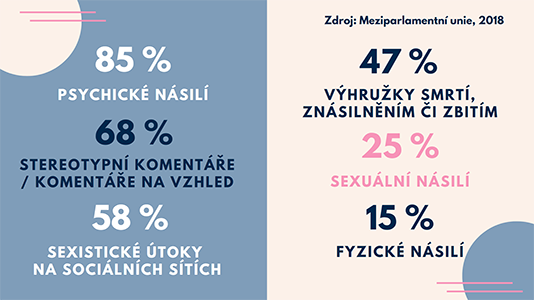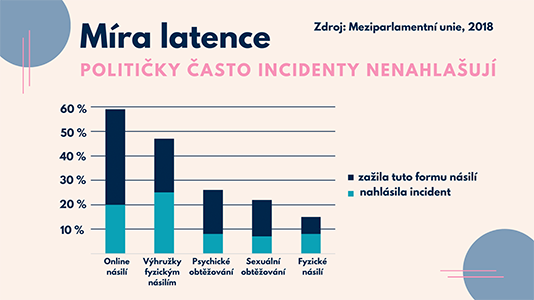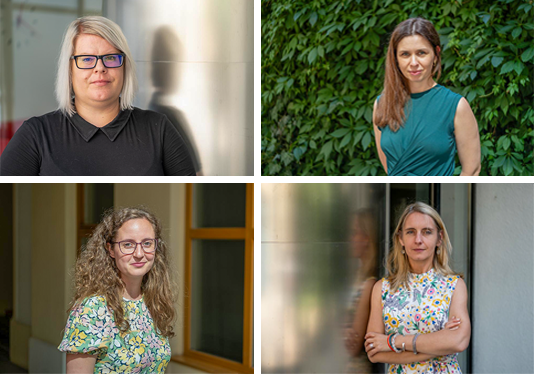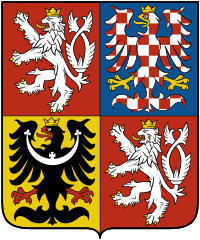#OurStories: #StopHate project opens the debate for the first time on harassing behavior towards publicly active women

Published
The Forum 50 % Project #StopHate: Raising Awareness about Various Forms of Violence against Women in Political and Public Life drew attention to a topic that is not addressed much in Czech society. Women are exposed to many times more attacks on their person in public than men.
The topic of behavior towards publicly active women is new in Czech society. As the project implementer, director of the 50% Forum (NGO) Veronika Šprincová, the project is one of the first to do it big. It maps the situation in the Czech Republic, brings together women from different areas of public life to share their experiences and to discover that hateful behavior towards them is not their personal failure.

Seminar held as part of the project
A thing that concerns 80% of publicly active women…
Appearance comments, sexist slurs, questioning of expertise, online violence, hateful responses, email and mobile spamming, threats. These are some of the forms of harassing behavior and violence that publicly active women have to face. "Data of the Interparliamentary Union show that more than 80% of female politicians across Europe have encountered some form of violence during their public activities," says the expert guarantor of the project, Markéta Kos Mottlová from Forum 50%. That it only applies to top politicians? Not. "It also happens at the municipal level. People feel that they can afford to get even closer to the person, to be even more personal, because we all kind of ´know each other here´," says Verona Ballay, a representative of Prague 4 and Prague 12, about her experience.
Documented and visible attacks are just the tip of the iceberg. Most of them are hidden, but they sometimes have devastating effects on the victims. Some women, on the other hand, leave social media and refrain from commenting in public.
Zdokumentované a viditelné útoky jsou přitom jen pověstnou špičkou ledovce, většina jich je skryta, ovšem na oběti mají leckdy devastující účinky. Některé osobnosti se zase stáhnou ze sociálních sítí a zdrží se komentářů ve veřejném prostoru. Monika Ladmanová, head of the representation of the European Commission in the Czech Republic, gives a specific example: „former Commissioner Věra Jourová has decided to completely close her FB account due to the hateful comments under her contributions and posts on Facebook. She called Facebook a 'highway of hate' and said she would not participate in it.“
Actress Simona Babčáková also has her experience: „Since the migration crisis, I have absolutely stopped commenting on anything that happens in the public space and is of a political nature, because I am protecting myself. And I'm not crazy.“
…and men?
Of course, men are also exposed to public ´pillaging´, attacks in the media or hate speech on social media. But as sociologist Marie Heřmanová from the Institute of Sociology of the Academy of Sciences of the Czech Republic explains: „There is a lot of research from which it follows that women are exposed to many times more attacks on their person in the public space, whether on the Internet or in traditional media, than men. At the same time, attacks directed at women are different, more often sexualized, attacking appearance or marital status.“
„In many countries, publicly active women who speak up are met with incomprehension and the statement that this happens to men too and therefore there is no need to deal with it. But the difference is precisely in the degree, in the intensity of the attacks," adds M. Ladmanová, head of the European Commission's representation in Prague.


Healing sharing and solidarity
As part of the project, thematic workshops were first held for various circles of women: for politicians, for journalists, for civically active women and for academics. Within them, the women not only learned something about the topic, but could also share their experiences, or even start talking about the problem with someone, sometimes for the very first time. At the subsequent joint seminar, the participants had the opportunity to discuss their experiences across areas of public active life. The participants of the workshops and seminars welcome the project very much. One of the participants of the round table, a former active politician, who confided that she too experienced all forms of harassing and violent behavior. However, the subject was taboo then, she was even ashamed of what was happening to her and denied it. There was no one to confide in, no one to understand and help her. So, according to this former politician, the project is very necessary.
"The workshop that took place as part of the project brought me hope. I have been observing the situation for 15 years and I see a clear improvement in how women and girls are willing to articulate the problem, how willing they are to share it," says gender expert Hana Tenglerová, according to whom solidarity between women, mutual understanding and support is also very important. And also the knowledge that women are not alone in this. "This happens to most women, but it's still hard to talk about and a lot of us still feel alone. So also space for meeting and sharing is very important," adds sociologist Marie Heřmanová.

Veronika Šprincová, direcor of Forum 50 % NGO.; Marie Heřmanová, sociologist
Markéta Kos Mottlová, project expert; Monika Ladmanová, head of Representation of the European Commission in Prague
Tricks and domaninace techniques
The project is financed by Norway Grants under the Human Rights program, but it is not the only imprint of Norway in it. The workshop participants also learned about the so-called concept of dominance techniques from the Norwegian social psychology professor Berit Ås. „These are techniques by which people in a more powerful position maintain this position," Veronika Šprincová explains the so-called five-finger theory. "I was surprised that a large proportion of women were not even aware that they were experiencing any of this. And only when it was named, when they heard the experiences of others, did they realize that certain insinuations, a style of communication or behavior that is happening to them is not okay and they should defend themselves against it," describes Verona Ballay, one from the participants of the workshop for female politicians who encounter a large part of the described techniques in local politics.

Domination Techniques - Five Finger Theory by Berit Ås
The role of the media
The media also have their role in the whole issue. "What I notice the most is hate speech or sexist comments on social media and in the media. Unfortunately, the media live off that toxic culture to a large extent," states sociologist Hana Tenglerová. "The media should not portray female politicians in a stereotypical, sexist way, but report on them similarly to men. This is, for example, the case of Slovak President Zuzana Čaputová, who the media systematically reports on as a blonde head of state," explains her view of media Verona Ballay.

Participants in the workshops were also gender expert Hana Tenglerová and representative of the Municipal Council of Prague 12 Verona Ballay
What can each of us do…
We can individually contribute to the gradual improvement of the situation, for example, by not being indifferent. "When we see a hateful comment, we express the opposite opinion, we publicly stand up for the person towards whom the hateful comment is directed, or at least write to him/her privately that we support him/her," activist Johanna Nejedlová lists little things that can support victims of hateful behavior, for example, to turn to law enforcement authorities because that's the only way the barriers can be set. Simona Babčáková offers a similar recipe: "If someone hates someone, let's focus attention in the opposite direction. Let's do good marketing for good things. And let's support people who have the courage to present themselves. Let's say: thank you, you also speak in my voice," suggests the actress.

Actress Simona Babčáková and director of Konsent (NGO) Johanna Nejedlová filming an interview about the project
…or will we find a comprehensive society-wide solution?
As part of the project, there is also a broader investigation of the situation in the Czech Republic and mapping of examples of good practice abroad and in our country. One of the outputs of the project should be a handbook that summarizes these tips and helps share good practice, for example from the academic environment or the media and in politics. The project also includes an awareness campaign, which aims to raise awareness of hate speech among the wider public. Because, as the activist and director of Konsent (NGO) Johanna Nejedlová says: "We will not take up the fight against violence against public officials until we start effectively prosecuting and punishing it. It is a broader social problem, requiring broader social solutions."
New legislation dealing with the prevention and protection of victims of gender-based violence is being discussed at the EU level. Verona Ballay also hopes that better times are coming: „Compared to the 1990s in the Czech Republic, when we laughed at the fact that a woman even expressed an opinion in an entertainment program on TV, we are gradually moving on, realizing that such behavior is not okay," says the representative of Prague 12.
Hana Tenglerová also perceives the shift. „Around 2008, a methodology was created to deal with sexual harassment at universities. The reaction from academia was largely negative. Time pulled the curtain and today the methodologies are posted on the university's website," concludes the gender expert.

As part of the project, four workshops focused on politicians, journalists, academics and other publicly active women took place
More about Forum 50 %
More about #StopHate project
More about Human Rights programme
| Project name: | #StopHate: Osvěta o různých formách násilí vůči veřejně aktivním ženám |
|---|---|
| Project promoter: | Forum 50 % (NGO) |
| Project partner: |
- |
| Programme: | Human Rights |
| Grant: | 1 427 911 CZK |
| Cíl projektu: | The project raises the awareness of the professional and lay public about gender-based violence against a specific group of women - politicians and publicly active women - and opens up a discussion about its possible solutions. At the individual level, the project mainly leads to the realization that the specific personal experiences of politicians and publicly active women are not "just their problem", that they are not isolated and stand-alone cases. Sharing and networking strengthens their mutual solidarity; Thanks to the transfer of good practice from abroad and the sharing of experience between different sectors (academic, non-profit, private and public), the first concrete steps will be proposed and possible solutions for the future will be outlined; At the level of educating the general public, there will be an increase in awareness of the existence of violence against female politicians and publicly active women. The goal of the project is to shift the perception of this problem from the current state, when it is seen by publicly active women themselves and the wider public as "something that belongs to political/public work in a way and nothing can be done about it", to a more sensitive view that perceives violence on politicians and publicly active women as a negative but solvable problem. |

